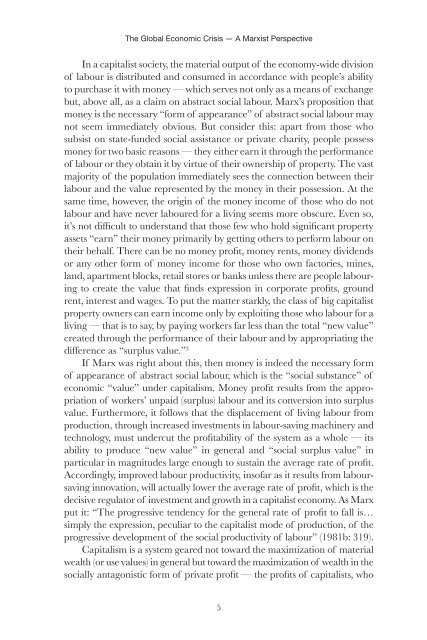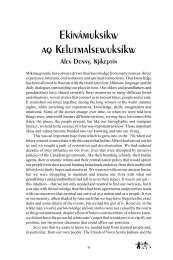The Global Economic Crisis — A Marxist Perspective - Fernwood ...
The Global Economic Crisis — A Marxist Perspective - Fernwood ...
The Global Economic Crisis — A Marxist Perspective - Fernwood ...
You also want an ePaper? Increase the reach of your titles
YUMPU automatically turns print PDFs into web optimized ePapers that Google loves.
<strong>The</strong> <strong>Global</strong> <strong>Economic</strong> <strong>Crisis</strong> <strong>—</strong> A <strong>Marxist</strong> <strong>Perspective</strong><br />
In a capitalist society, the material output of the economy-wide division<br />
of labour is distributed and consumed in accordance with people’s ability<br />
to purchase it with money <strong>—</strong> which serves not only as a means of exchange<br />
but, above all, as a claim on abstract social labour. Marx’s proposition that<br />
money is the necessary “form of appearance” of abstract social labour may<br />
not seem immediately obvious. But consider this: apart from those who<br />
subsist on state-funded social assistance or private charity, people possess<br />
money for two basic reasons <strong>—</strong> they either earn it through the performance<br />
of labour or they obtain it by virtue of their ownership of property. <strong>The</strong> vast<br />
majority of the population immediately sees the connection between their<br />
labour and the value represented by the money in their possession. At the<br />
same time, however, the origin of the money income of those who do not<br />
labour and have never laboured for a living seems more obscure. Even so,<br />
it’s not difficult to understand that those few who hold significant property<br />
assets “earn” their money primarily by getting others to perform labour on<br />
their behalf. <strong>The</strong>re can be no money profit, money rents, money dividends<br />
or any other form of money income for those who own factories, mines,<br />
land, apartment blocks, retail stores or banks unless there are people labouring<br />
to create the value that finds expression in corporate profits, ground<br />
rent, interest and wages. To put the matter starkly, the class of big capitalist<br />
property owners can earn income only by exploiting those who labour for a<br />
living <strong>—</strong> that is to say, by paying workers far less than the total “new value”<br />
created through the performance of their labour and by appropriating the<br />
difference as “surplus value.” 3<br />
If Marx was right about this, then money is indeed the necessary form<br />
of appearance of abstract social labour, which is the “social substance” of<br />
economic “value” under capitalism. Money profit results from the appropriation<br />
of workers’ unpaid (surplus) labour and its conversion into surplus<br />
value. Furthermore, it follows that the displacement of living labour from<br />
production, through increased investments in labour-saving machinery and<br />
technology, must undercut the profitability of the system as a whole <strong>—</strong> its<br />
ability to produce “new value” in general and “social surplus value” in<br />
particular in magnitudes large enough to sustain the average rate of profit.<br />
Accordingly, improved labour productivity, insofar as it results from laboursaving<br />
innovation, will actually lower the average rate of profit, which is the<br />
decisive regulator of investment and growth in a capitalist economy. As Marx<br />
put it: “<strong>The</strong> progressive tendency for the general rate of profit to fall is…<br />
simply the expression, peculiar to the capitalist mode of production, of the<br />
progressive development of the social productivity of labour” (1981b: 319).<br />
Capitalism is a system geared not toward the maximization of material<br />
wealth (or use values) in general but toward the maximization of wealth in the<br />
socially antagonistic form of private profit <strong>—</strong> the profits of capitalists, who<br />
5





